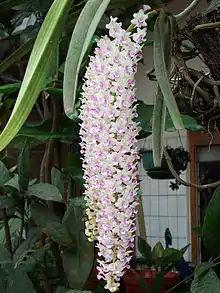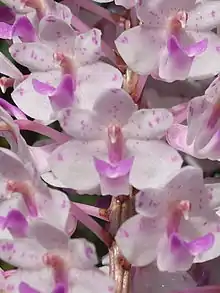Rhynchostylis retusa
Rhynchostylis retusa (also called foxtail orchid) is an orchid, belonging to the Vanda alliance. The inflorescence is a pendant raceme, consisting of more than 100 pink-spotted white flowers. The plant has a short, stout, creeping stem carrying up to 12, curved, fleshy, deeply channeled, keeled, retuse apically leaves and blooms on an axillary pendant to 60 cm (24 in) long, racemose, densely flowered, cylindrical inflorescence that occurs in the winter and early spring. It is famous for its use as an hair-ornament worn by Assamese women during folk dance Bihu on the onset of spring.[2]
| Rhynchostylis retusa | |
|---|---|
 | |
| Scientific classification | |
| Kingdom: | Plantae |
| Clade: | Tracheophytes |
| Clade: | Angiosperms |
| Clade: | Monocots |
| Order: | Asparagales |
| Family: | Orchidaceae |
| Subfamily: | Epidendroideae |
| Genus: | Rhynchostylis |
| Species: | R. retusa |
| Binomial name | |
| Rhynchostylis retusa | |
| Synonyms | |
| |
Distribution

The plant is an epiphyte growing on tree trunks in open forests or at forest margins at elevations of 300–1,500 m (980–4,920 ft). It can be found in Bhutan, Cambodia, China (Guizhou, Yunnan), India, Indonesia, Laos, Malaysia, Myanmar, Nepal, Philippines, Singapore, Sri Lanka, Thailand, and Vietnam.[3]
In India, the plant is most common in North-East, Orissa and Andhra Pradesh. In Andhra Pradesh, the plant is called by Telugu name Chintaranamu. Due to bio-piracy, the plant is on the verge of extinction in India. Rhychostylis retusa is recognized as the state flower of Arunachal Pradesh and Assam in India as well the Uva Province of Sri Lanka.

Care
The plant requires regular watering and applications of fertilizer throughout the year,[2] although it will die if the leaves are wet frequently. It prefers indirect lighting. Flowering usually occurs in late spring.[4]
Medicinal uses
In Malabar District various preparations of the plant were used against asthma and tuberculosis and for 'nervous twitchings' (referable possibly to tic disorder), cramp, epileptic spasms, vertigo, palpitations, kidney stone and menstrual disorder. The plant has also been used in Assam to treat wounds, cuts and bruises. The plant has been used as an emollient in India and Nepal. Under the name of rasna the root is used to treat rheumatism throughout the Indian subcontinent.[5]
Significance in Assamese culture
In Assam, it is popularly known as কপৌ ফুল (Kopou Ful), and is an integral part of a Bihu dancer's attire. The plant is considered to be a symbol of love, fertility and merriment and, for this reason, the inflorescence forms an essential element in the traditional Assamese marriage ceremony. Such is its beauty, usefulness and broad cultural significance in the state, that this spectacular wildflower is also grown as a much-loved garden plant by almost all Assamese families and has justly been adopted as the state flower of Assam.
References
- "Rhynchostylis retusa". World Checklist of Selected Plant Families (WCSP). Royal Botanic Gardens, Kew. Retrieved 28 April 2018.
- "Rhynchostylis Retusa" Archived 2016-03-06 at the Wayback Machine. Orchid Blooming. Retrieved on 2013-03-18.
- Xinqi Chen; Jeffrey J. Wood. "Rhynchostylis retusa (Linnaeus) Blume, Bijdr. 286. 1825". Flora of China. Missouri Botanical Garden, St. Louis, MO & Harvard University Herbaria, Cambridge, MA. Retrieved 28 April 2018.
- (1998-01-20). "Rhynchostylis page". Orchid Species.com. Retrieved on 2013-03-18.
- Orchid Biology: Reviews and Perspectives, III ed. Arditti,Joseph,pub.Comstock Publishing Associates - a division of Cornell University Press 1984 ISBN 0-8014-1040-1 (v.1) : Chapter 2 : Ethnobotany of the Orchidaceae by Lawler,Leonard J. page 101
External links
 Media related to Rhynchostylis retusa (category) at Wikimedia Commons
Media related to Rhynchostylis retusa (category) at Wikimedia Commons Data related to Rhynchostylis retusa at Wikispecies
Data related to Rhynchostylis retusa at Wikispecies
